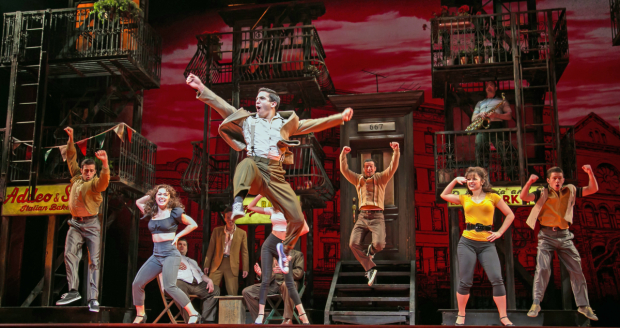A Bronx Tale
Chazz Palminteri’s childhood stories of Belmont Avenue are put to music at Paper Mill Playhouse.

(© Jerry Dalia)
Singing mobsters are a tricky business. Woody Allen's Bullets Over Broadway, which came and left Broadway's St. James Theatre in a matter of months in 2014, was the last casualty of the genre. Though Nick Cordero, who now stars in the musical adaptation of Chazz Palminteri's A Bronx Tale at Paper Mill Playhouse, emerged from his role as Cheech in Bullets victorious with a Tony nomination and a corner on the market of musical mob bosses. From that role to Sonny (the character Palminteri made famous in A Bronx Tale's iconic 1993 film) Cordero once again decisively walks that fine line between musical-theater boisterousness and the threatening subtlety of the man on Belmont Avenue you don't want to cross. When it comes to that delicate balancing act, the show as a whole could take a few lessons.
Since Palminteri introduced us to A Bronx Tale in 1990 with his autobiographical solo play, modesty has been the piece's greatest asset. He unassumingly puts forth his story — one of many he tells us came out of the Bronx in the 1960s — about Calogero's working-class Italian upbringing and premature detour into the world of organized crime after falling into the good graces of local mob boss Sonny LoSpecchio. Murder, racially motivated violence, and other sordid activities are a near constant throughout the narrative. Yet even as the bullets and Molotov cocktails fly, A Bronx Tale has always hung its hat on its status as a quiet coming-of-age tale. Quiet, however, is a difficult fort to hold when song-and-dance musicals live their lives at a high decibel — especially with hit-makers Alan Menken and Glenn Slater at the piano.
The songwriting team wisely follows the film's lead, opening the show with a doo-wop quartet made up of Jess LeProtto, Corey Mosello, Dominic Nolfi, and Keith White (who go on to play Calogero's motley crew of neighborhood buddies). They croon under a street lamp before Beowulf Boritt's striking set of fire escapes and front stoops, among other nostalgic elements of '60s blue-collar Bronx living. Meanwhile, Calogero (Jason Gotay, a strong and sympathetic leading man) establishes himself as a narrator reflecting on the past and often walking through it like a ghost. The smooth atmospheric opener quickly explodes into a groovy refrain of "Belmont Avenue," with William Ivey Long's timely costumes flying to the rhythm of Sergio Trujillo's energetic choreography, which puts a distinct "Broadway" stamp on the piece in every brassy, jazz-splitting, back-flipping sense of the word.
The tunes are catchy, and a few of them memorable — particularly Young Calogero's celebration of his newfound neighborhood fame in "I Like It," performed by the extraordinarily talented Joshua Colley, who has acting and singing chops like a seasoned veteran. One by one, famous scenes — from Calogero's introduction to the game of dice to Sonny's tried-and-true "door test" — are transformed into charming musical vignettes with an entertainment value that is undeniable. But even with a few of the film's profanities and period-setting racial slurs making the script's final cut, you can't shake the feeling that this wonderfully gritty story has been given a Disney shine.
Fortunately, as book writer, Palminteri keeps his dialogue as authentic as ever, flowing naturally from the streets of his childhood to the Paper Mill stage. The organic language is delivered best from Richard H. Blake and Nick Cordero as Calogero's rival confidantes. Blake plays Calogero's noble bus-driving father Lorenzo with the same soft sturdiness injected intothe role on film by Robert De Niro (who codirects the musical alongside four-time Tony winner Jerry Zaks). Meanwhile as Sonny (the part Palminteri originated), Cordero uses his oak-like physical presence and kind face to likably win his little buddy (nicknamed "C") some intoxicating street cred while terrorizing an entire neighborhood.
A Bronx Tale movie purists can rest assured that the storyline stays faithful to the film. Calogero's taboo romance with the African-American teenager Jane from Webster Avenue (played by the charming and vocally superb Coco Jones) is woven into the plot, albeit a little too sparingly. And, though it's now paired with one of the show's most saccharine numbers, "Look to Your Heart," Lorenzo's signature maxim remains: "The saddest thing in life is wasted talent." With a company and creative team collectively at the top of their game, A Bronx Tale is party to no wasted talent. The humble tale may just be one best told without a brass band.








